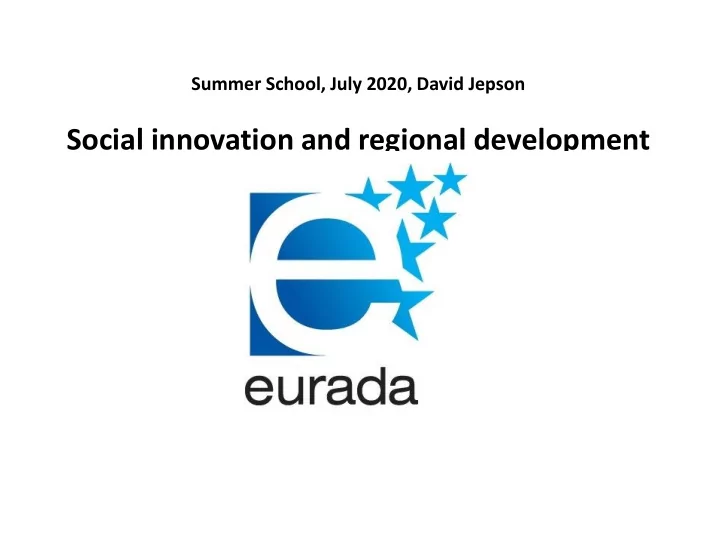

Summer School, July 2020, David Jepson Social innovation and regional development
David Jepson Involved with EURADA for 30 years! Economic development and labour market consultancy in most member states and beyond Current focus on social innovation - impact of an ageing population on economic development and how to integrate refugees and migrants Now working with ACH, a leading provider of integration support for refugees and migrants with priority for economic opportunity
Preparing a project - Defining the problem?
Defining the problem? • At the start of any potential project application we must define it. • Who is it a problem for and who would need to be involved in tackling it? • Why does existing provision not solve the problem? • How can the problem be solved? Who will benefit and how • What if? Look at options / possible solutions? • How to attain sustainability, socially and environmentally?
Common problems for regional development • Need for innovation and diversity / over dependence on key sectors • Lack of skills / know how in the labour market • Need for more enterprise, new start ups, small business scale up? • Lack of competitiveness internally and outwardly • Conflict between economic development and social change / social cohesion, for example creating growing inequalities and impacting on public services • And now the impact of Corona Virus lockdown
What is social innovation • Firstly it is about paradigm shift. It is about new ideas, new solutions, and new relationships and cannot be “more of the same” in the context of demographic, social and cultural change • Secondly, the benefits derived from social innovation will be shared by the wider community AND specific actors and organisations who are involved. • Thirdly, it is about new relationships and networks between stakeholders and territories, about cross sectoral working, about new capabilities and about more effective use of resources and assets (not necessarily more resources). • Lastly social innovation is not the prerogative or privilege of any organizational form or legal structure. Solutions often require the active collaboration of constituents across government, business, and the nonprofit world. • How can social change be turned into a tool for local and regional development ?
Drivers of social change
Current drivers for social innovation • We can identify common demographic changes which will have a major impact on local and regional development • We have an ageing population with more older people living longer, the very old often with complex needs • People often enter the labour market later and leave it earlier than was the case in early post war decades • In many cases there are also fewer younger people, especially in certain regions / localities • This places major demands on public services and on public finances
Current Drivers for social innovation 2 • We also have seen major population movements between EU member states, migrants seeking work from third countries and refugees fleeing conflict • Evidence suggests that this is a long term trend • Some refugees / migrants are highly skilled but many are unemployed or stuck in entry level or illegal work • Dependence on public services creates alienation and isolation for these communities and causes conflict with existing residents.
Refugees / Migrants #rethinking refugees • See migrants and refugees as an asset through a business case approach not a problem or humanitarian issue • Benefits in terms of wider integration and through added value within the the economy. • Diversity brings innovation through new ideas / products / services and networks • Aim to ensure upskilling of refugees / migrants into median level work through training, recruitment and through access to social networks not just entry level work • Support migrant / refugee small business development/ enterprise through refocus of mainstream business support infrastructure • Corona virus rethink about what skills are really important and the overall concept of skills for recruitment and staff development
Next steps • Consider defining project solutions which take use social innovation to attain economic development objectives • Identify partners / stakeholders who can engage in preparing and implementing projects • A range of funding programmes at EU level (ERDF UIA / ESF, AMIF, Erasmus, Horizon 2020 as well as national / local and private sector funding • Use expertise and networks of Eurada and other bodies to identify good practice.
Next practical steps • Development of vital social capital and access to social networks – often central to labour market access • Technical and vocational training • Building direct links with employers especially in growth sectors via pathways • Applied language and communication training • Community level approach • Support for SMES from refugee / migrant communities.
Sustainable Economic Development Thanks for listening davidjepson@civileuroperspective.org.uk / David.Jepson@ach.org.uk
Recommend
More recommend